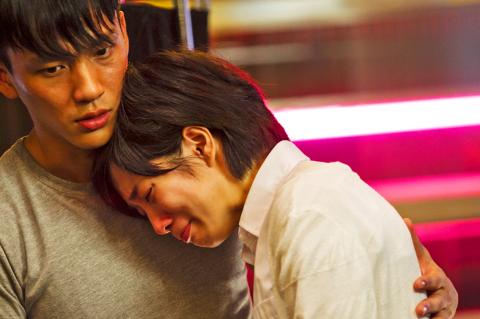Taipei’s rocketing real estate prices and growing wealth gap occupy a central place in Love in Vain (獨一無二), Alex Yang’s (楊順清) first feature film in 10 years.
The drama explores the difficulties faced by younger generations in the money-driven metropolis of Taipei. The story is actually more audience-friendly than it sounds, but the less-than-perfect execution renders the film mediocre.
The film opens with a business tycoon, played by acclaimed actor Chin Shih-chieh (金士傑), and his subordinate urinating in the pool of a luxury apartment. They rave about a big investment in China, while several young women carouse in a nearby suite. The first five minutes of the film effectively introduces the world we are about to enter, in which houses are not built for living but making a profit, and where vileness and depravity lurk beneath the glitz.

Photo courtesy of Good Day Films
Then things get a bit messy, moving on two parallel plots. Both feature newcomer Yen Tsao (曹晏豪), who plays two characters that look alike but lead completely different lives. A-yan is an innocent country boy trying to make it in Taipei, while the cynical and manipulative Xiao Yu runs a modeling agency and thirsts for celebrity.
The fates of the two strangers intertwine, evolving into a modern allegory of corruption and moral confusion in contemporary Taiwanese society.
In 1991, Yang co-wrote Edward Yang’s (楊德昌) A Brighter Summer Day (牯嶺街少年殺人事件), and has since been known for his cinematic commentary on how Taiwan’s changing society impacts its urban residents. Like his award-winning Taipei 21 (台北二 一) in 2004, Love in Vain contains plenty of sharp observations and social criticism. A-yan’s Taipei residence, for example, is merely an empty, temporary space which is later sold as a piece of premium real estate.
But such moments of insight are rare and often overshadowed by the prosaic, uneven narration.
The character studies remain largely superficial, and the criticism is cursory and sketchy.J.C. Lei’s (雷婕熙) performance is an example of how the inexperienced leads do not have the strength and experience to carry out the emotional and narrative weight. It is almost embarrassing to watch her overact her role as a sultry young woman, while awkwardly delivering pretentious lines.
While Tsao and Lei struggle, accomplished veterans such as Chin and Leon Dai (戴立忍) handle their supporting roles with ease and charm. There is no balance in between.
In the end, Love in Vain does not live up to its ambition. And to film buffs familiar the director’s works since his Edward Yang days, prepare to be disappointed.

Taiwan has next to no political engagement in Myanmar, either with the ruling military junta nor the dozens of armed groups who’ve in the last five years taken over around two-thirds of the nation’s territory in a sprawling, patchwork civil war. But early last month, the leader of one relatively minor Burmese revolutionary faction, General Nerdah Bomya, who is also an alleged war criminal, made a low key visit to Taipei, where he met with a member of President William Lai’s (賴清德) staff, a retired Taiwanese military official and several academics. “I feel like Taiwan is a good example of

March 2 to March 8 Gunfire rang out along the shore of the frontline island of Lieyu (烈嶼) on a foggy afternoon on March 7, 1987. By the time it was over, about 20 unarmed Vietnamese refugees — men, women, elderly and children — were dead. They were hastily buried, followed by decades of silence. Months later, opposition politicians and journalists tried to uncover what had happened, but conflicting accounts only deepened the confusion. One version suggested that government troops had mistakenly killed their own operatives attempting to return home from Vietnam. The military maintained that the

Taipei Mayor Chiang Wan-an (蔣萬安) announced last week a city policy to get businesses to reduce working hours to seven hours per day for employees with children 12 and under at home. The city promised to subsidize 80 percent of the employees’ wage loss. Taipei can do this, since the Celestial Dragon Kingdom (天龍國), as it is sardonically known to the denizens of Taiwan’s less fortunate regions, has an outsize grip on the government budget. Like most subsidies, this will likely have little effect on Taiwan’s catastrophic birth rates, though it may be a relief to the shrinking number of

Since its formation almost 15 years ago, Kaohsiung rock band Elephant Gym (大象體操) has shattered every assumption about contemporary popular music, and their story is now on screen in a documentary titled More Real Than Dreams. It’s an unlikely success story that says a lot about young people in Taiwan — and beyond. For a start, their sound is analog. In the film, guitarist Tell Chang (張凱翔) proudly says: “There is no AI in our sound.” His sister, bass player KT Chang (張凱婷) is the true frontwoman — less for her singing abilities than for her thunderous sound on the instrument. Fast like